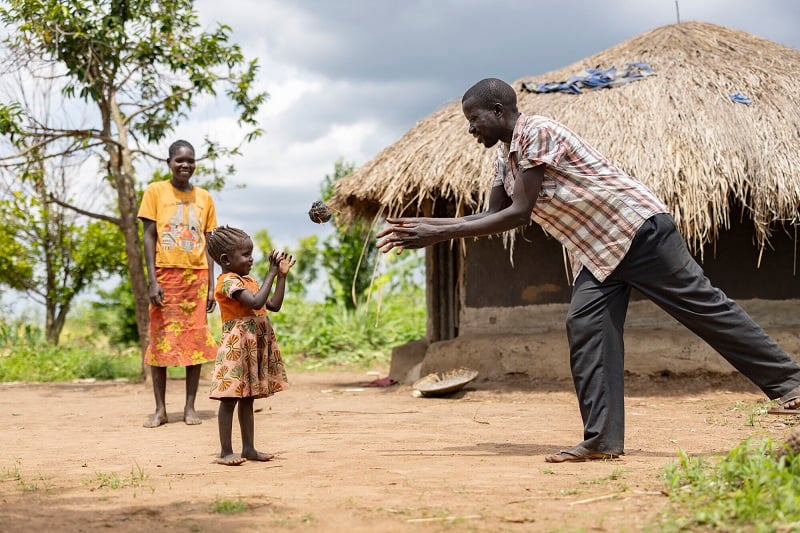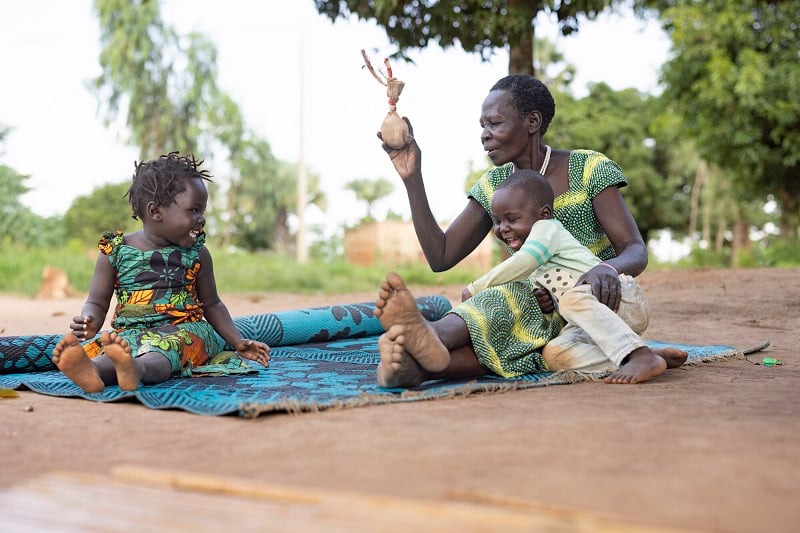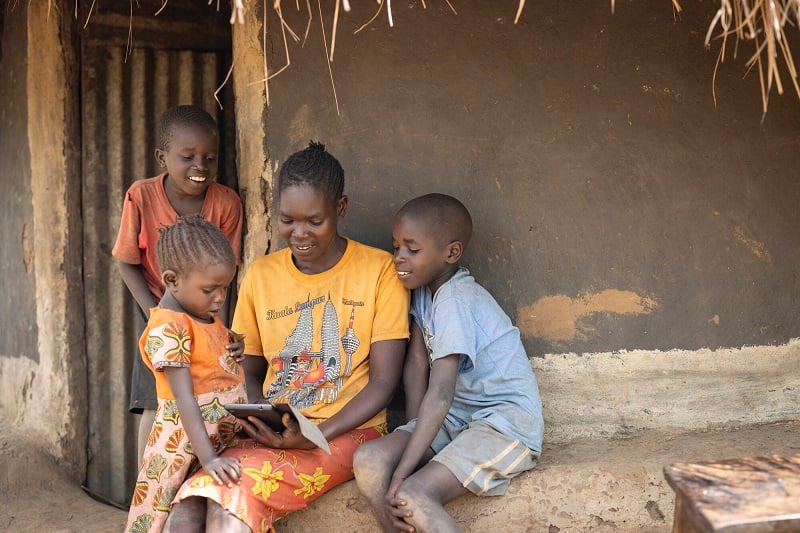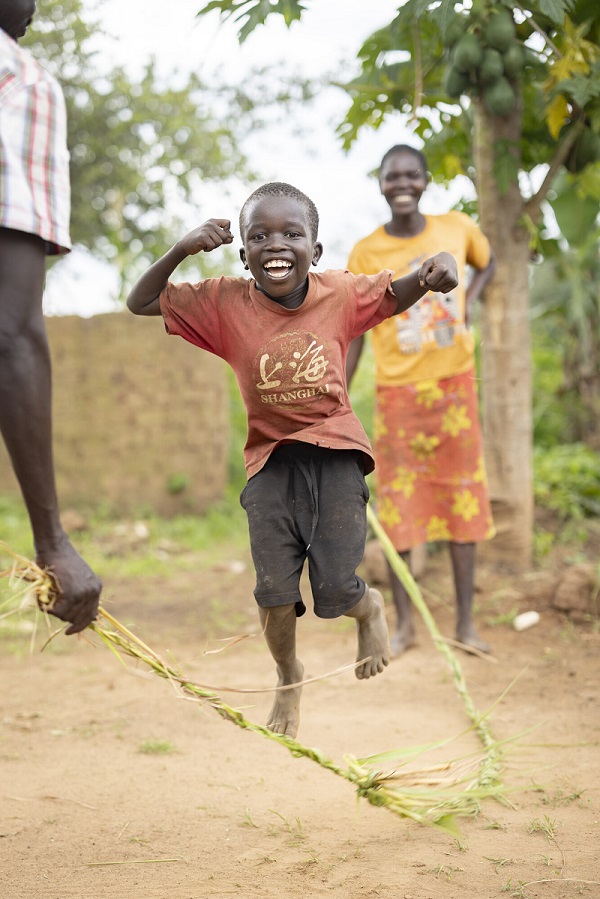Site will be
unavailable for maintenance from June. 4, 11:30 p.m., to June 5, 12:30 a.m. ET. Thank you for your
patience!
Parents in Uganda embrace the power of play
Posted on 04/23/2024
 Bernard, a dad in Uganda, enjoys a game of ball with his daughter Racheal, 3.
Bernard, a dad in Uganda, enjoys a game of ball with his daughter Racheal, 3.
For most parents and caregivers, just meeting their family’s basic needs is a full-time job in and of itself – managing schedules, preparing meals, staying on top of housework. This is especially true in the world’s most underserved communities, where parents are even more preoccupied with the basics of survival and with finding water, food and work to sustain their families. For all these reasons and more, it’s easy for play to be seen as a waste of time.
This attitude is changing now in rural Uganda, where ChildFund operates its Come Play with Me project.
Supported by the Lego Foundation, the project helps caregivers understand the importance of play in their children's development and in strengthening relationships at home. An emphasis is placed on caregivers playing and interacting with their children and on making toys from locally available resources. Learning tablets with educational games and activities were also introduced to families during the COVID-19 pandemic and have continued to be a helpful resource for learning and engagement at home.
Why is play so important?
The Lego Foundation and ChildFund have joined forces to engage children and families from six different countries through the Come Play with Me project. Come Play with Me aims to support children and their caregivers in communities with low access to early childhood development and education opportunities, using both in-person sessions and radio messaging to reach parents with ideas on how they can connect with their children. ChildFund early childhood development specialist Natan Tilahun says, “The main objective of this project is to use various methods to help parents play with their children at their home.”
Far from being a waste of time, play helps children – especially young children 5 and under – build social skills, develop creativity and self-confidence, and improve their cognitive abilities. It’s also just plain fun, a connective experience that allows parents and children to bond like no other. When parents and other caregivers play with their kids, they are speaking children’s natural developmental language and opening the door to an open, trusting relationship that can last a lifetime. Whether through structured activities or unstructured free play, play supports children to develop into well-rounded individuals who are ready to tackle whatever challenges life may bring.
Helen, 69, and her grandchildren have been participating in the Come Play with Me project since early 2022. As her adult children must often leave home for weeks or months at a time to work, she is her grandchildren’s primary caregiver.
 Helen plays with a homemade doll with her grandchildren, Esther, 4, and Arnold, 2.
Helen plays with a homemade doll with her grandchildren, Esther, 4, and Arnold, 2.
Through the project, Helen has learned the importance of play in the lives of her grandchildren and that childhood should not solely consist of performing household chores and going to school. Whereas she used to be excessively strict with her family’s routines and activities, these days she prefers “loving and mentoring” her grandchildren, who range between 18 months and 12 years of age. Helen says, “The grandchildren used to be scared of me because I used to be harsh on them. Now we are much closer.
“When I was growing up, there was a lot of hostility in the household. Children were beaten for doing wrong, and husbands would beat their wives. These new [project activities] have brought happiness to us. Parents and caregivers shouldn’t argue in front of the children. Otherwise, they will just copy you.”
Helen has learned that “if one of my grandchildren is doing something wrong, I should not shout at them or beat them. I should take them aside and talk to them in a low voice. It’s a better way. Now, the children open up and confide in me. If they have any needs – problems at school, or they aren’t feeling well – they tell me. Last week, there was an incident at school with a boy-girl relationship. My granddaughters told me about it, and we were able to discuss it.”
Jackyline’s family has also been participating in Come Play with Me since early 2022. Jackyline and her husband Bernard, who earn their living as subsistence farmers, regularly help the children make toys like balls and jump ropes from banana fibers or corn stalks. Their home wasn’t always this playful. “[The children] used to not even play around the house,” Jackyline says. “[My husband and I] would stop them. Now we encourage it. The children are around a lot more, and we spend more time together as a family.
“In the tablet, there are riddles and puzzles that help them with language and games that teach math. They have done better in school since we’ve had it. There are also lessons about nutrition, sanitation and hygiene,” says Jackyline.
 Jackyline and her children enjoy playing learning games together on the tablet.
Jackyline and her children enjoy playing learning games together on the tablet.
Embrace the power of play
How can you help the children in your life learn and grow through play? Take some time to stop what you’re doing, drop your adult activities (and worries) and intentionally connect with a child in the way they understand best. Here are just a few ideas!
1. Plan a “yes” day. On this special day, try to say “yes” to everything your children ask to do together. (Within reason, of course!) It’s a great way to play role reversal and let the children feel like they’re in charge for a change.
2. Go on a walk or bike ride with family. Exercising together is a healthy – and playful – way to stay connected. You might be surprised at all the great talks you have!
3. Have an arts and crafts day at home. Gather household objects and make something fun! The internet is full of fun ideas for arts and crafts that can boost brain development.
4. Take a trip to the park. It’s the perfect place for a picnic, a nature scavenger hunt or a game of “I spy!”
5. Play a video game together – or break out the traditional board games! Games are a great way to connect with your child and enjoy a little friendly competition.
6. Water activities. If the weather allows, most children are delighted by sensory play with water. Break out a sprinkler or just fill some big bowls with water and bubbles!
7. Create an indoor or outdoor garden. Teach children about the natural world by letting them explore how things grow.
8. Add daily technology-free time to your schedule. Children benefit immensely from unstructured, screen-free play with you. Ask them what they want to play, then let them lead!
Whatever you do, we’re sure the kids will love getting to spend the extra time with you. Remember: The time you spend playing together is never a waste. Your children will always appreciate and benefit from it – and, when they’re a little older, they’ll remember it with joy.
Milly, 37, another mom who participates in the Uganda program, sums it up best: “When I was a child, parents saw play as a waste of time, but now I see that play is instrumental in a child’s growth."

Loading...

